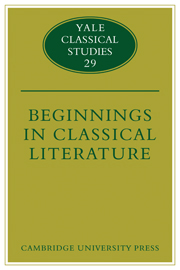Book contents
- Frontmatter
- Contents
- Introduction: beginning at Colonus
- How Greek poems begin
- The Muse corrects: the opening of the Odyssey
- Sappho 16, Gorgias' Helen, and the preface to Herodotus' Histories
- Tragic beginnings: narration, voice, and authority in the prologues of Greek drama
- Plato's first words
- Plautine negotiations: the Poenulus prologue unpacked
- Proems in the middle
- Openings in Horace's Satires and Odes: poet, patron, and audience
- An aristocracy of virtue: Seneca on the beginnings of wisdom
- Beginnings in Plutarch's Lives
- “Initium mihi operis Servius Galba iterum T. Vinius consules …”
Plato's first words
Published online by Cambridge University Press: 10 January 2011
- Frontmatter
- Contents
- Introduction: beginning at Colonus
- How Greek poems begin
- The Muse corrects: the opening of the Odyssey
- Sappho 16, Gorgias' Helen, and the preface to Herodotus' Histories
- Tragic beginnings: narration, voice, and authority in the prologues of Greek drama
- Plato's first words
- Plautine negotiations: the Poenulus prologue unpacked
- Proems in the middle
- Openings in Horace's Satires and Odes: poet, patron, and audience
- An aristocracy of virtue: Seneca on the beginnings of wisdom
- Beginnings in Plutarch's Lives
- “Initium mihi operis Servius Galba iterum T. Vinius consules …”
Summary
Socrates: ʾΑλλὰ τόδε γε οἶμαι σε ϕάναι ἄν, δεῦν πάντα λόγον ἕσπερ ζῷον συνεστάναι σῶμα τι ἔχοντα αὐτοῦ, ὣστε μήτε ἀκήϕαλον εἶναι μήτε ἄπουν, ἀλλὰ μήσα τε ἔχειν καὶ ἄκρα, πρήποντα ἀλληλοις καὶ τῷ ὅλῳ γεγραμμήνα.
Phaedrus: Πῶς γὰρ οὔ;
Plato, Phaedrus 264cA tail behind, a trunk in front,
Complete the usual elephant.
A. E. Housman, The Elephant, or the Force of HabitI In literature beginnings are always an end. They mark the end of a period of indecision and indeterminacy and seal with the stamp of closure the exclusion of all but one possible beginning. The importance of beginnings and of first words for ancient readers and critics is revealed by the significance they attached to the first word of the Iliad – μῆνιν. Indeed, the first words of a poem rather than its “title” were enough to identify it. The cult of beginnings in the appreciation of ancient literature was so much a matter of faith that it had to be blasphemed, as it was, by Lucian in his True History. Here Lucian as protagonist interrogates the soul of Homer in Hades; his were the burning philological questions of Lucian's age. What city did the poet come from – Chios, Smyrna, or Colophon? Necromancy produces the startling response that he was not a Greek but came from Babylon, where he was called Tigranes.
- Type
- Chapter
- Information
- Beginnings in Classical Literature , pp. 113 - 130Publisher: Cambridge University PressPrint publication year: 1992
- 5
- Cited by

